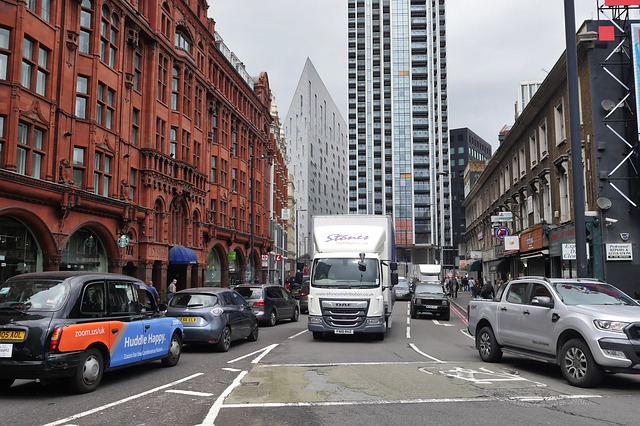An independent expert-led commission on the future of industrial land has warned that a chronic shortage of space in London and rocketing rents for industrial premises risks damaging the city’s economy and hindering its ability to service the needs of the population.
In its report published on Thursday (27th January), the Industrial Land Commission finds that pressure on industrial land, primarily from the need to build new homes, is so great that it’s squeezing out businesses and leading to job losses. The Commission warns against the further loss of industrial land and is calling for urgent action to address London’s industrial land shortage, support businesses and protect jobs.
The Industrial Land Commission, chaired by leading property industry expert Liz Peace CBE and convened by Centre for London, raises the alarm over the loss of industrial land across London and the UK’s biggest city regions. The Commission’s final report found that over the last 20 years, London lost 24% of its industrial floorspace while Greater Manchester and the West Midlands saw theirs decrease by 20% and 19% respectively.
In London, the loss of industrial floorspace was equivalent to 840 football pitches (6 million sq m) between 2000/01 and 2020/21.The losses have been particularly acute in inner London, where more than 40% of total industrial floorspace has been converted to other uses over the same period, increasing to 62% in Hackney, 52% in Camden, Islington, and Westminster and 51% in Hammersmith and Fulham.
Much of London’s industrial space has been released to build more housing, which the Commission argues will eventually have a knock-on effect on how London functions. Unlike smaller cities in the UK, London’s size means that industrial accommodation for critical activities – such as waste removal, delivery depots and repair and maintenance activities – must be available in or near the city centre rather than just at the city fringe. And the rise of online retail and distribution centres have compounded the issue by creating fierce competition for remaining industrial space: industrial site vacancy rates dropped to just 4% in 2021, compared to 16% in 2001.
The Commission argues that London cannot afford to lose any more industrial land. Jobs in traditional industrial activities such as manufacturing, repair and warehousing are worth more than £78bn to the city’s economy, but the true figure is likely to be even higher as this excludes non-industrial activities such as most creative industries. The Commission’s report highlights that the number of jobs that rely on industrial land is actually increasing, with local employment opportunities being created at all skill levels, and the potential to host up to 12,000 new green jobs.
To address London’s industrial land shortage, the Commission proposes six solutions:
- Champion industrial spaces and improve representation: The Commission recommends an independent and influential representative body is set up by businesses to make the case for London’s industrial spaces, inform planning policy and raise the profile of industrial activities. The Mayor of London should also appoint a powerful champion in City Hall for industrial land alongside supporting local authorities to upskill their staff working with industrial land.
- Improve evidence about the supply and demand for industrial floorspace: London boroughs should develop more granular, up to date analysis of their industrial land and real estate companies should make market data more readily available.
- Enhance local planning, protection and flexibility: The Mayor of London and London boroughs already have strong powers to retain industrial space through the planning system, but the losses of industrial space witnessed over recent years suggests they have not been using their powers to protect this land as much as they could have done. London boroughs urgently need to step in to ensure there is sufficient and suitable industrial accommodation on ‘their patch’.
- Make better use of existing industrial land: The Mayor of London and London boroughs should co-invest in developments that intensify remaining industrial land such as multi-storey warehouses. National government should help incentivise intensification such as through business rates relief.
- Make co-location work: The Mayor of London and London boroughs should subsidise developments that provide industrial floorspace in new locations where none currently exists.
- Enhance strategic planning: The Mayor of London and City Hall’s planners should be given as much as power as possible to devise London’s land use strategy, while national government’s role in approving it should be limited in scope.
The Industrial Land Commission was established to explore how London can make the best use of limited available land to meet the varied needs of the city. The Commission met four times between March and October 2021 and was supported by a secretariat at Centre for London.
Liz Peace CBE, Chair of the Industrial Land Commission, Chairman of the Old Oak and Park Royal Development Corporation, and Chair of Trustees at Centre for London said: “London’s industrial land has long been unloved, misunderstood and often regarded as a relic of the past. Yet, and while they might not realise it, every Londoner, even those that never step onto an industrial park or into a factory, needs the services that take place in these spaces, from waste processors to mechanics, bakers to film makers.
“The demand for homes in London clearly must be satisfied but sacrificing the city’s industrial land to meet that demand is short-sighted and ignores the need for jobs for the people living in those homes and for all those vital services required in a thriving city.
“The pressure on London’s industrial land represents a potentially serious crisis for the city. That’s why the Industrial Land Commission believes that the Mayor and London boroughs must do more to protect, intensify and provide new industrial spaces, while also championing the critical functions that industrial land enables in our city.”











